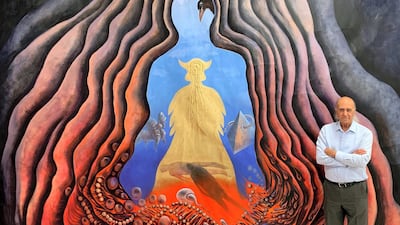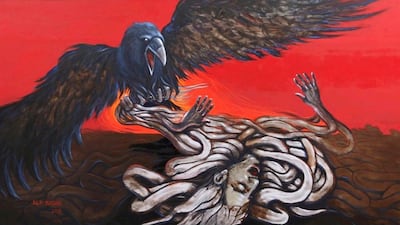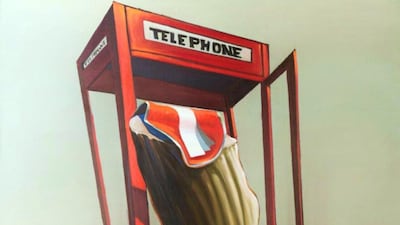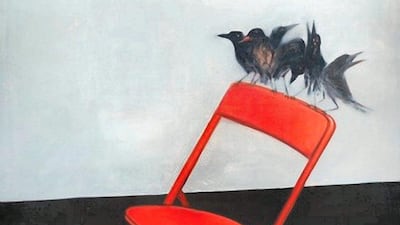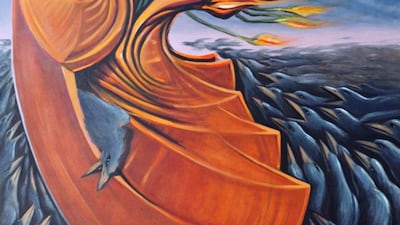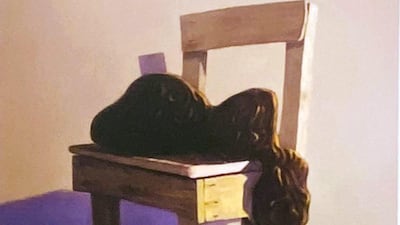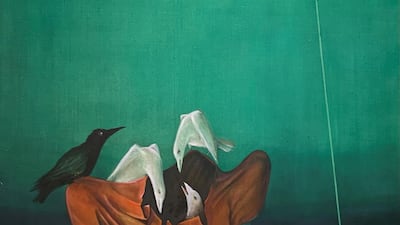For decades, Ala Bashir has been attempting to change the perception of how humans view life through his surrealist paintings that reflect a reality no ordinary human can imagine.
The Iraqi artist, who was a former professor of plastic and reconstructive surgery at the University of Baghdad, bases works around his visions of how individuals must figure out the purpose of their existence.
The subjects of his paintings stay in the viewer's mind not only for their unique style but for the shocking reality they portray. The majority of them depict a chair and a human body taking different positions and shapes.
"Art is like science, it's a tool to investigate our existence. It should invite people to see beyond what they see, the artist should encourage people to use what's inside rather than their sight," Bashir tells The National.
His paintings reflect emotional toll of devastating conflicts that Iraq and the world have endured, pushing him to question life.
"I believe the function of art is not to entertain people, it's there to encourage them to see what's hidden in life," he said. "There's tragedy everywhere – so that's why I think art should push people to dig deep into what's good in our existence and how we can become better."
As a surgeon, Bashir is known for pioneering techniques for reattaching hands but, as an artist, he wants to motivate individuals to reconnect with their emotions.
'Predicament of Man'
On Wednesday, London auction house Bonhams will be selling Bashir's Predicament of Man in its Modern and Contemporary Middle Eastern Art sale.
The painting depicts an empty, headless body, with several ravens on top and inside of it.
"I succeed in expressing the suffering of human beings in this painting," he says. "It's just skin, there's nothing inside his body. He's alive and can move, but he's empty because of the external and internal problems that he feels.
"Once a human is born, he's challenged until the end ... by how to live, figuring out their purpose in life but also by violence that surrounds them."
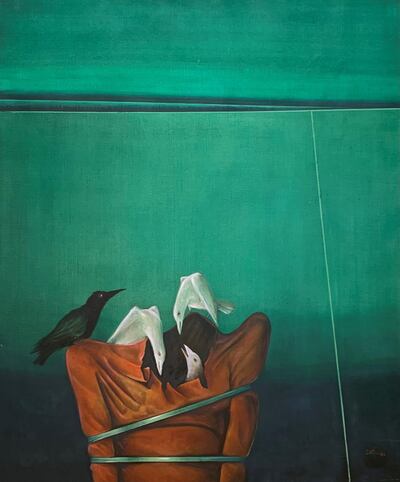
For Bashir, this is the predicament of man.
Born in Khanaqin in 1939, the artist witnessed radical political changes in Iraq from the 1950s up until today, which has shaped his thoughts and artistic techniques.
"Although Predicament of Man was made in 1980, I've had thoughts on this subject before then. I cannot say that I was lucky or unlucky to witness what happened in 1958, 1963, coups and revolutions, that were followed by violence and bloodshed," he says.
Bashir's artistic talent was discovered at an early age by his primary school teacher and he was later encouraged by his father to paint and sketch. He studied medicine in Baghdad in the late 1950s, working to become a doctor by day and by night, painting at the Baghdad College of Fine Arts.
By the end of the decade, Bashir was introduced to a group of artists who pioneered Iraq’s modern art movement and became a member of the Impressionist group. Among these notable names were Hafidh Aldroubi, founder of the Impressionist Group movement, and Jewad Selim, founder of the Baghdad Modern Art Group in 1952.
In 1971, he later obtained a doctorate in plastic surgery from the Royal College of Surgeons in Edinburgh and took part in many exhibitions at home and abroad.
Bashir was also part of former Iraqi President Saddam Hussein’s medical team, serving as one of almost a dozen doctors for Saddam for nearly 20 years (between 1984-2003).
He is the holder of many prizes such as the second prize of the Baghdad International Poster Exhibition (1982) and the gold prize of the Baghdad International Art Festival (1988).
Despite all his accolades, Bashir is still trying to find the meaning of life.
"My paintings, whether people agree or not, reflect the questions of life in a different way. Sometimes people don’t get the message because they don't like to be reminded of facts of life," he says.
He is set to hold an exhibition in London next September.
